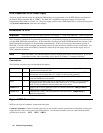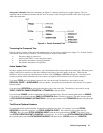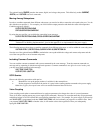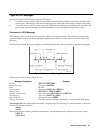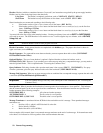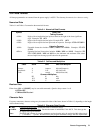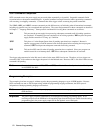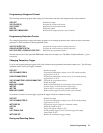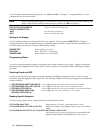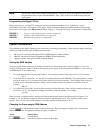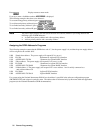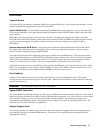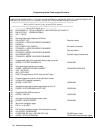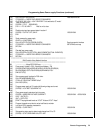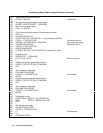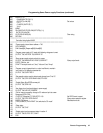
54 Remote Programming
You can remotely save and recall operating states. See *SAV and *RCL in "Chapter 7 - Language Dictionary" for the
parameters that are saved and recalled.
Note When you turn the power supply on, it automatically retrieves the state stored in location 0. When a power
supply is delivered, this location contains the factory defaults (see *RST in Chapter 7).
OUTP OFF;VOLT:LEV 65;PROT 68 Program a desired operating state.
CURR:LEV 33;PROT:STAT ON
*SAV 2 Save this state to location 2.
*RCL 2 (Later) recall this same state.
Writing to the Display
You can include messages to the front panel LCD in your programs. The description of DISP:TEXT in "Chapter 7 -
Language Dictionary" shows the number and types of permitted display characters. In order to write to the display, you
must first change it to text mode as shown in the following example:
DIS:MODE TEXT Switch display to text mode.
RECALLED 2 Write “Recalled 2” to the display.
DIS:MODE NORM Return dispaly to its normal mode.
Programming Status
You can use status programming to make your program react to events within the power supply. Chapter 8 explains the
functions and bit configurations of all status registers. Refer to Figure 8-1 in that chapter while examining the examples
given here.
Detecting Events via SRO
Usually you will want the power supply to generate interrupts (assert SRQ) upon particular events. For this you must
selectively enable the appropriate status register bits. The following examples allow the power supply to assert SRQ under
selected conditions.
1. STAT:OPER:ENAB 1280;PTR 1280;*SRE 128 Assert SRQ when the unit switches between CV and CC modes.
2. STAT:OPER:ENAB 1;PTR 1;NTR 1;*SRE 128 Assert SRQ when the unit enters or leaves calibration mode.
3. STAT:QUES 3;PTR 3;*SRE 128 Assert SRQ when the unit goes into overvoltage or overcurrent condition.
4. STAT:OPER:ENAB 1280;PTR 1280;
STAT:QUES 3;PTR 3;*SRE 136
Assert SRQ under any event occurring in 1. or 3., above.
Reading Specific Registers
You can exercise program control without interrupts by reading specific registers.
STAT:OPER:1280;EVEN?
Enable only the CV and CC events and read their status.
STAT:OPER:ENAB 1313;PTR 1313;EVEN?
Enable all conditions of the Operation Status register and read any
events.
STAT:OPER:ENAB?;EVENT?;:STAT:QUES:ENAB?;EVEN?;:*ESE?;*ESR?
Read which events are active and which events are enabled in the
Operation, Questionable, and Standard Event status registers.



